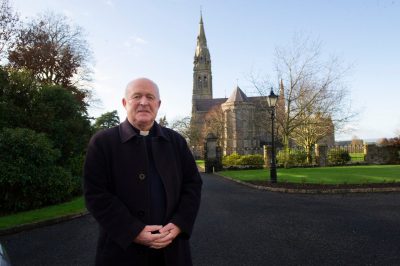
By Sarah Mac Donald - 08 September, 2020

Bishop Larry Duffy at St Macartan’s Cathedral. Pic: Rory Geary.
The Coronavirus pandemic is a symptom of a much wider ecological crisis and has shown us how vulnerable we are as human beings and how fragile our world is, Bishop Larry Duffy has said.
In a Pastoral Letter on the Season of Creation to the people of the Diocese of Clogher and to all people of goodwill, Bishop Duffy notes how a small invisible virus stopped the world and forced people to go into lockdown.
“As we celebrate the Season of Creation this year, we are asked to stop and think about the type of world we want to return to when this crisis has passed. As a human family, we cannot be healthy if the planet is not healthy.”
He said the pandemic has much in common with the environmental crisis and he appeals to people to examine their lifestyles and judge current practices
In the two-part letter, the Bishop of Clogher reminds people that there have been many more severe weather events causing death, destruction and displacement of peoples.
“We are repeatedly seeing many consequences of global warming which results in loss of life and threatens many different species of animal and insect life, the marines and their ecosystems.”
He highlights Pope Francis’ decision to celebrate the fifth anniversary of Laudato Si’ to underscore the urgency of the ecological crisis, by designating this year a special Laudato Si’ Anniversary Year until May 2021.
“He has done this to remind all Catholics of the urgent need to take action in order to protect our common home,” Dr Duffy writes as he invites people during the Season of Creation to think about how they might better take care of our common home and how they might join with others to “protect life and the Earth that God has created and has given us to care for”.
In the pastoral letter, Bishop Duffy stresses that the Coronavirus pandemic shows just how interrelated we are and how much we depend on each other.
“It has also highlighted how dependent we are on the earth for our survival. The pandemic is a call for us to reflect; an opportunity for us all to judge ourselves, to judge what we are doing and how we might have been contributing to the problem by our lifestyles. And the problem is wider than simply the ecological dimension – it is also a social one. We must integrate questions of social justice into debates on the environment.”
“Questions such as human rights abuses, the religious intolerance, discrimination, racism, the attacks on the life of the unborn and the denial of the right to life – these are all part of what Pope Francis calls ‘colonising interests’ and ‘the throw-away culture’ underpinning our neglect of creation and the creator.”
The Season of Creation is being marked throughout the month of September and concludes on 4th October, the feast of St Francis of Assisi. The theme for this year’s Season of Creation is ‘Cultivating Hope’.
Hope, Bishop Duffy writes, is found in action and each of us can do something.
“We can take action to protect our biodiversity, the birds and insects. During lockdown many people remarked on noticing the beauty of nature more, the birdsong, the trees, the wildlife. This is what happens when we slow down. We need to reconnect with nature and rekindle that sense of awe and wonder with creation – the presence of God. We are being invited to fall in love again with God’s Creation, like St Francis, to see nature as part of our family.”
He urges people during the Season of Creation and beyond it to try to take small actions such as walking or cycling more, watching their energy use, sorting out their recycling, thinking about how they use the resources of this planet.
He suggests that parishes should begin to look at how they can become more sustainable and more eco-friendly and he invites people to read Laudato Si’ and to set up a Laudato Si’ reading group or a care for creation group, while each parish could plant a native Irish tree.
“May our fragility, as shown by the pandemic, be our hope. Let us all use this time wisely; to pray and to act; to examine our consciences about the lifestyles we have; to choose simplicity of living as a route back to wonder and awe in God’s presence and, moreover, to show solidarity with our fellow beings and with creation through our compassion and actions. Everything is connected.”
He concludes, “This is our time. As Pope Francis puts it: ‘Let ours be a time remembered for the awakening of a new reverence for life, the firm resolve to achieve sustainability, the quickening of the struggle for justice and peace, and the joyful celebration of life.’ (LS, 207)”